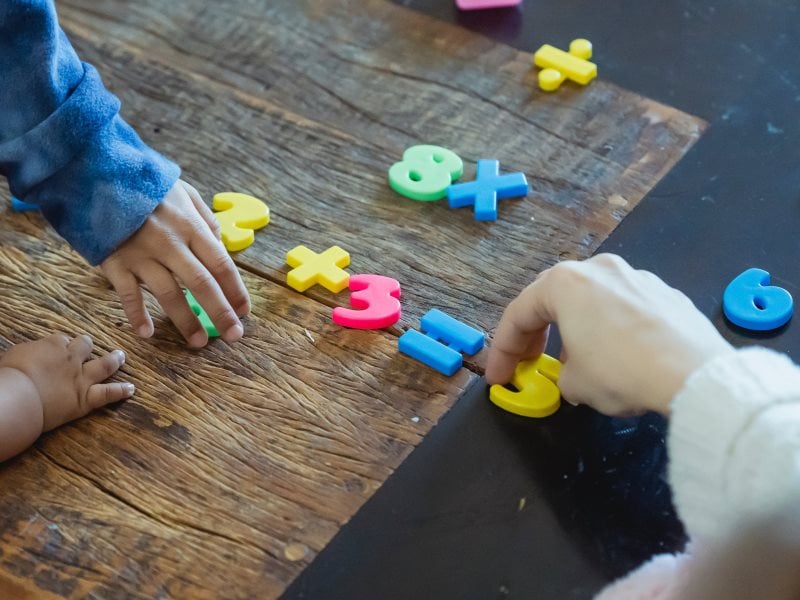
Your Child’s Brain doesn’t get exercised when it’s most critical
Your child’s brain works very similarly to their body; if it is not exercised, it will not be able to work at its full potential. When the brain learns something new, nerve cells in the brain grow together in connections called synapses. When a synapse is not used, the brain decides it is unimportant, and gets rid of that synapse.
Doing math, especially mental math, maintains these synapses and creates new ones. This is the brain’s equivalent of working out - these exercises will help to keep the brain healthy and strong.
Many children don’t get the chance to exercise their brains at a young age. Involvement in pre-k has been shown to improve children’s math and reading skills much further down the road. Children who went to pre-k tend to be more prepared for school, and less likely to repeat a grade in elementary school.
Unfortunately, it is not mandatory in the US that pre-k is attended, or even provided as an option. Under 70% of children are enrolled in preschool, and access is inconsistent at best.
Even kindergarten is not considered mandatory in the US. 35 states do not require children to attend kindergarten, and 5 of those states don’t even require school districts to offer kindergarten. Learn more here.
American Education Standards are being lowered
Because of performance expectations and struggles faced by both teachers and students, curriculums are not as rigorous as they are thought to be.
Although the average national GPA seems to be rising, the knowledge students have is less than it was 30 years ago. Pressure surrounding student performance and maintaining high graduation rates may have led to classes becoming less intense, rather than education becoming better.
Preventing students from falling behind a grade level potentially leaves more gaps in education. It isn’t uncommon to find a high school student years behind where they should be, either in their math or reading levels. Read more about it here.
States like Oregon have changed their standards as a response to the pandemic, no longer requiring students to prove they are proficient in reading, writing, and math through testing before graduating high school, and relying solely on class grades.
Curriculum Constraints
Even the best teachers may not have the time or resources to teach each student in an efficient or effective way.
Student learning can be split into as many as seven styles. Even the best teachers cannot teach in a way that is conducive to so many different approaches, especially when class sizes are increasing faster than ever.
If a teacher is required to get through a certain amount of information by the end of the school year, it may not leave enough time to add extra focus to a topic students are really struggling with. Some teachers may even take the week before a standardized test to focus on specific information, which takes time away from the normal curriculum.
Missing Bricks
Because of these gaps in education due to time limits or item-teaching in preparation for standardized testing, some students are left without a solid foundation.
People are under the impression that math is hard, and this stereotype is partially due to the fact that so many students are rushed through math.
When trying to learn a concept quickly, many students fall back on memorization, and forget the concept immediately afterward. Since math is a cumulative subject, and each new concept builds on the last, this technique doesn’t work for math classes.
These knowledge gaps are like missing bricks at the bottom of a wall: nothing built on top of those gaps will be stable. Math concepts taught to a student without a proper understanding of what came before will be much harder to understand than they otherwise would be.
Culture Celebrates Mediocrity
We’ve turned our lack of math abilities into a running joke, especially among celebrities. Buzzfeed posts videos like “Adults Try 5th Grade Math”, where they laugh about their inability to solve these problems. This phenomenon is fairly recent, and can also be seen on TV with shows like “Are You Smarter Than a 5th Grader?”.
Even celebrities admit they don’t know simple math like how to calculate a tip. Children who idolize these celebrities are unlikely to value math when it is framed as a useless skill.
Living in a society where math is not seen as valuable means that many students don’t see the point in learning math, despite all the benefits math education can provide. They start to hate math, because they see it as difficult and worthless.
Breaking this cycle will be valuable not only for individual students, but for the whole generation who benefits from the increased knowledge and cognitive ability.
What can you do about it?
There may be some barriers to your child reaching their full potential, but there is plenty you can do to help them.
Help your child use their brain at a young age. If preschool and kindergarten are available, enroll your child to help them grow academically and socially. Playing educational games at home with your child can also help them get a “workout” for their brain.
Don’t be satisfied if your child is “at grade level”. Requirements for each grade are inconsistent between school districts, and even within districts. These standards may also be lower than they were 10-20 years ago.
Find your child’s missing bricks. Using our assessment, pinpoint any gaps in your child’s knowledge that could prevent them from having a solid foundation for their math education.
Don’t celebrate math mediocrity. Make sure your child knows that math is important to their life, and will help them have a successful future.





